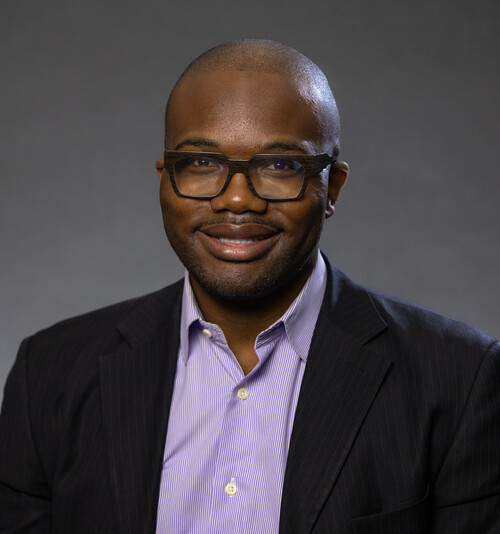Chika Okafor

2022 Harvard Horizons Scholar Chika Okafor was a student a Yale Law School when he went to a talk by the human rights attorney Stephen Bright and heard something that changed the course of his academic career.
“He said that, when it comes to sentencing, prosecutors represent one of the most—if not the most—influential actors in the criminal justice system,” Okafor remembers. “I always thought it was the judge or the jury. It was a very new insight for me.”
That insight led to Okafor’s research as a PhD student at the Harvard Kenneth C. Griffin Graduate School of Arts and Sciences, and to his Harvard Horizons project, “Prosecutor Politics: The Impact of Election Cycles on Criminal Sentencing in the Era of Rising Incarceration.”
While juries convict and judges pass sentence, it is the elected local prosecutor—the district attorney (DA)—more than any other actor who determines the course of criminal justice in the United States. The decision on whether to charge an individual, what charges to file, whether to drop a case or offer a plea bargain and the specific terms of that bargain are unreviewable powers of DAs.
Okafor says that his study is the first to look at the causal relationship between DA election cycles and criminal sentencing at the national level, and to compare the relationship between regions and across time. Applying sophisticated econometric models to sentencing data that covers millions of individuals in the criminal justice system from 1986 to 2006, Okafor looks for statistically significant changes in outcomes when local DAs are running for office.
“The study has two outcome variables: admissions and total months sentenced, both per 1,000 of population,” he says. “There might be a situation where more people are going to prison—or the same number are going to prison but for slightly longer periods of time. My method captures the change in the intensity of criminal sentencing activity in an election year.”
His findings suggest that politics matter in sentencing. Okafor says that the rate of admission to prison and total months sentenced both increase in a DA election year. Moreover, the effect is dramatic. During an election year, a district that might be in the 50th percentile within its state for the intensity of sentencing activity could jump to the 80th percentile.
Not surprisingly, race is a factor.
“The intensity of sentencing activity increases across the board during an election year, on average” Okafor says. “But counties with higher levels of pro-white racial bias have more severe sentencing outcomes for black defendants throughout the entire election cycle.”
Okafor’s research does not determine whether the increase in sentencing is due to DAs seeking out stiffer penalties, prosecuting more people, or some other factor. That’s because those outside of a district attorney’s office generally don’t have access to its inner workings, the daily actions and decisions there that shape the administration of justice. One aspect of that work that deserves more scrutiny, according to Okafor, is plea bargaining.
“Over 95 percent of felony convictions occur via plea bargains,” he says. “DAs are the ones who negotiate those pleas. That means individual sentences are often more strongly influenced by the district attorney than by the outcome of judge or jury trials.”
Okafor says that his goal is to use quantitative analysis to inform policy decisions and help make meaningful improvements in the way our criminal justice system operates. He knows there’s no “silver bullet” for the problem of mass incarceration but believes that understanding the political factors that impact sentencing—and changing the public perceptions that drive them—is a step on the road to a system and a society that is safer, fairer, and more just.
“My research suggests DAs respond to political factors,” he says. “Those factors are shaped by public sentiment. Thus, focusing on public perception toward punishment—on “hearts and minds”—could help change for the better the way that agents in the criminal justice system operate.”

